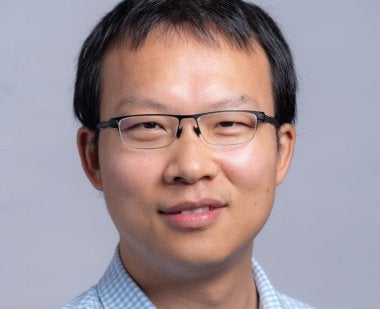
Today, the University of Maryland announced the launch of the Artificial Intelligence Interdisciplinary Institute at Maryland (AIM), which will support faculty research, learning opportunities, and advancements in ethical AI technology. The institute will serve as a collaborative hub for AI at UMD, uniting existing AI centers and projects across campus.
Jing Liu, assistant professor in education policy, is on the team working on one of these projects, the Grand Challenges Grant-funded Values-Centered Artificial Intelligence initiative, and was a member of the faculty working group that proposed the idea for AIM. Liu discusses the importance of the new institute and how it will help advance his own innovative work with AI.
What is your role in the Artificial Intelligence Interdisciplinary Institute at Maryland (AIM)?
In the summer of 2023, UMD President Darryll J. Pines and Senior Vice President and Provost Jennifer King Rice convened a faculty working group to consider how to consolidate different AI-related research and teaching activities across campus, and how to make UMD unique compared with peer institutions by having a concentrated effort on AI. I was lucky enough to be a member of this working group. Under the leadership of Hal Daumé III from the College of Computer, Mathematical and Natural Sciences, who is now the inaugural director of AIM, the working group drafted a detailed plan to establish a new interdisciplinary AI institute at UMD. I am really excited to see what we proposed come to reality today.
Why is it important to have a collaborative hub for AI at UMD?
UMD is already very strong on different aspects of AI. U.S. News and World Report ranked us #15 in AI programs this year. We have many exciting AI-related programs such as the Social Data Science Center, the National Science Foundation-funded Institute for Trustworthy AI in Law & Society (TRAILS), and the Values-Centered AI initiative. Students at UMD in total accumulated over 16,000 credit hours in AI-related coursework during the 2022-23 academic year. Given our proximity to Washington, D.C., and existing strength in AI, it makes sense to consolidate these different resources and activities to generate some synergy in both research and teaching.
A very important consideration of the working group was how to make this institute truly interdisciplinary. AI is already and will continue to infuse every aspect of human life. Addressing challenges and needs in an AI-infused world will require genuine interdisciplinary collaboration. The structure and design of AIM reflects these considerations.
How will AIM support the work you are doing with AI?
I could not be more excited to be part of AIM. Thanks to existing campus-level efforts, including the Grand Challenges Grants program, I am already working with colleagues from the UMD's A. James Clark School of Engineering and College of Information Studies in my AI research. I think AIM will make such collaboration much easier in terms of resources, space and administrative support.
I look forward to being part of AIM and shaping the efforts in AIM around education-related research. K-12 education has been a strong focus of AIM from its conception. I also really appreciate that AIM puts ethical and trustworthy use of AI front and center, which is extremely important for research and applications at the intersection of AI and education.
How is your work with AI transforming education for good?
My work focuses on how to leverage AI to support educators with their teaching and professional development and simultaneously honor their central position in education. Doing this work requires strong domain knowledge in education theory and practice and cutting-edge AI techniques, as well as a participatory process that involves working with educators, students and school leaders directly. Over my years of working in this space, I see that to use AI to transform education for good and truly benefit educators and students, all of these elements are critical. I believe AIM will be able to support all these aspects and help UMD strengthen its leading position in AI and education research.



